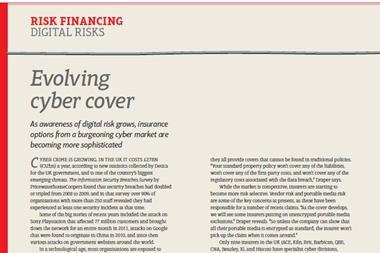Claims disputes as a result of inadequate disclosure are set to rise in a post-crisis era, according to leading research
Serios flaws in the way corporate insurance policies are arranged are leaving companies dangerously exposed, according to leading research firm.
“UK companies are exposing themselves to significant and unnecessary losses due to serious flaws in the way their corporate insurance policies are arranged,” said the study of commercial risk by the specialist research firm Mactavish.
Based on consultations with over 600 UK companies, the research paints an alarming picture of inadequate disclosure, widespread legal ignorance, managerial failures, deeply uncertain policies and a lack of understanding of how large claims are processed.
Bruce Hepburn, chief executive officer of Mactavish, called the findings “disturbing”.
“What we see today is a system that has prioritised low transaction costs above reliable insurance policies. This approach is not fit for purpose for the environment we are now moving into. UK businesses, especially medium-sized companies, are putting themselves unnecessarily at risk.”
He added that the role of insurance as a financial backstop is especially vital now. “The recession has left many companies taking on more risk to protect returns and boards are under increasing pressure to demonstrate effective corporate governance.”
Newly constrained balance sheets, tight credit and the vastly altered risk exposures brought about by globalisation and recession represent new and poorly understood threats, continued Mactavish.
At the same time, the report showed that insurers are taking a much tougher line on claims.
Richard Sykes, governance, risk & compliance lead at PwC, co-authors of the report, said: “Many UK companies are unaware they are facing costly and damaging gaps in their insurance coverage.”
The risk that an insurance policy won?t pay out is not being recognised by boards, he added.
“Companies need to make more informed decisions about how much risk they should retain or transfer, rather than simply seeking to minimise insurance expenditure.”
Insurers bare some fo the blame for this, added the report authors.
“Many insurers are failing to develop the necessary understanding of their clients? risk profile,” said Achim Bauer, insurance strategy partner at PwC. “This is leading to a no-win situation for both insurers and companies, creating a misalignment between risks and premiums, higher claims and more disputes.”
The report sets out seven protocols (see below) intended as a blueprint for change. These have been formally endorsed by leading industry players.
The seven Mactavish Protocols call for the following reforms:
1. Steps to make insurance buyers aware of their legal obligations and the key differences between insurance and general contractual law
2. A shake up in the risk-assessment process and drastic improvements in the way information is currently gathered, signed off and submitted
3. A two-stage tender process to maintain transaction efficiency and encourage far greater dialogue between buyer and insurer
4. An obligation on insurers to set out their understanding of a customer‟s risks and the detailed coverage being offered directly to the customer
5. Insistence that buyers explicitly assess the financial materiality of insurance to their business
6. An onus on insurers to discuss major loss scenarios directly with customers at the outset of the policy period to ensure customers understand how policies apply to their business in practice
7. The up-front specification by insurers of detailed loss response service elements to avoid uncertainty as to what happens procedurally when a large loss event occurs.
Downloads
Mactavish report
PDF, Size 3.35 mb



















